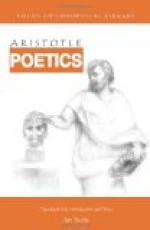Analysis of Contents
I ‘Imitation’ the common principle
of the Arts of Poetry.
II The Objects of Imitation.
III The Manner of Imitation.
IV The Origin and Development of Poetry.
V Definition of the Ludicrous, and a brief sketch
of the rise of
Comedy.
VI Definition of Tragedy.
VII The Plot must be a Whole.
VIII The Plot must be a Unity.
IX (Plot continued.) Dramatic Unity.
X (Plot continued.) Definitions of Simple and
Complex Plots.
XI (Plot continued.) Reversal of the Situation,
Recognition, and
Tragic or disastrous
Incident defined and explained.
XII The ‘quantitative parts’ of Tragedy
defined.
XIII (Plot continued.) What constitutes Tragic Action.
XIV (Plot continued.) The tragic emotions of pity
and fear should
spring out of
the Plot itself.
XV The element of Character in Tragedy.
XVI (Plot continued.) Recognition: its various
kinds, with examples.
XVII Practical rules for the Tragic Poet.
XVIII Further rules for the Tragic Poet.
XIX Thought, or the Intellectual element, and Diction
in Tragedy.
XX Diction, or Language in general.
XXI Poetic Diction.
XXII (Poetic Diction continued.) How Poetry combines
elevation of
language with
perspicuity.
XXIII Epic Poetry.
XXIV (Epic Poetry continued.) Further points of agreement
with Tragedy.
XXV Critical Objections brought against Poetry,
and the principles on
which they are
to be answered.
XXVI A general estimate of the comparative worth
of Epic Poetry and
Tragedy.
ARISTOTLE’S POETICS
I
I propose to treat of Poetry in itself and of its various kinds, noting the essential quality of each; to inquire into the structure of the plot as requisite to a good poem; into the number and nature of the parts of which a poem is composed; and similarly into whatever else falls within the same inquiry. Following, then, the order of nature, let us begin with the principles which come first.
Epic poetry and Tragedy, Comedy also and Dithyrambic: poetry, and the music of the flute and of the lyre in most of their forms, are all in their general conception modes of imitation. They differ, however, from one: another in three respects,—the medium, the objects, the manner or mode of imitation, being in each case distinct.
For as there are persons who, by conscious art or mere habit, imitate and represent various objects through the medium of colour and form, or again by the voice; so in the arts above mentioned, taken as a whole, the imitation is produced by rhythm, language, or ‘harmony,’ either singly or combined.
Thus in the music of the flute and of the lyre, ‘harmony’ and rhythm alone are employed; also in other arts, such as that of the shepherd’s pipe, which are essentially similar to these. In dancing, rhythm alone is used without ‘harmony’; for even dancing imitates character, emotion, and action, by rhythmical movement.




